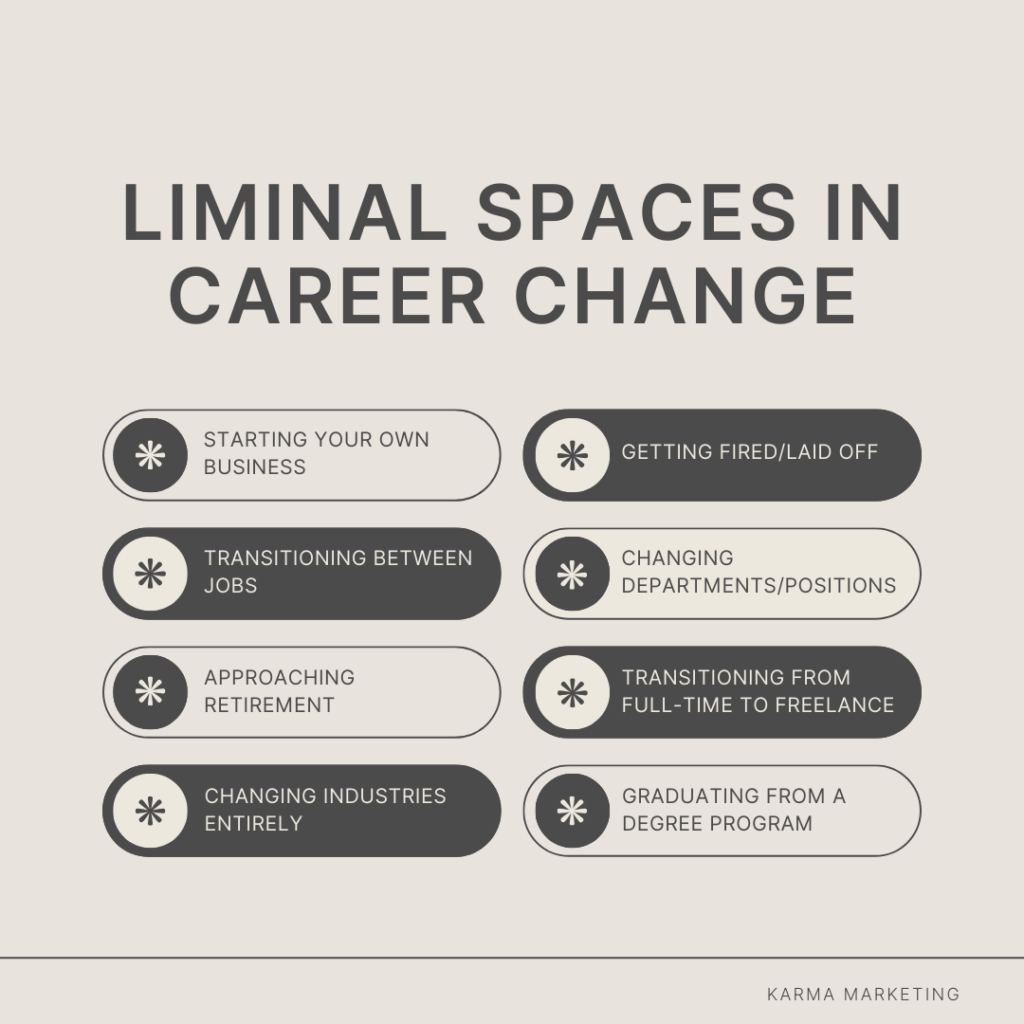From Pause to Progress: The Role of Creative Thinking in Career Change
We’ve all been there, haven’t we – that strange in-between state where the road ahead is unclear and the path behind feels distant. Perhaps it was your first day of college, moving to a new hometown, or waking each morning as dreams fade and reality sets in. Those transitional moments are uniquely unsettling, like being adrift on unmapped terrain. Your former identity has dissolved but the next chapter is yet unwritten. Liminal creativity occurs in transitional spaces, where the old way of thinking or being is left behind, but the new way has not yet been fully established.
As comforting routines fall away, an unfamiliar sense of possibility takes hold. It is in these perplexing borderlands between what was and what will be that the mind surrenders to wandering thoughts. Ideas take shape in the fog with no constraints of what came before or expectations of what is next. A rare window opens, offering glimpses outside standard thinking. These in-between places are life’s liminal spaces.
Of course, some liminal phases arise from major life changes as well. Think of the student who has submitted that final paper, having let go of their academic identity but not yet walked the stage to receive their diploma. Likewise, the employee who knows a new position awaits but hasn’t begun the transition feels suspended between roles.
Within these states of flux and change, one’s very sense of self is also in transition. Without the comfortable roles and routines that typically define us, our identities loosen too. Who are we becoming? What defines purpose when normal paths forward are obscured? This questioning can be disorienting but also liberating.
In all these in-betweens, we find ourselves suspended – disconnected from what we knew before but not fully integrated into whatever comes next. The familiar is falling away but the unfamiliar is still taking shape. It’s in these transitional spaces that we’re often most aware of possibilities, as the slate appears briefly wiped clean before us, ready to be reinvented.
Harnessing the Power of Transitional Moments through Liminal Creativity
Liminality, a term coined from the Latin ‘limen’ meaning ‘threshold’, refers to a transitional or in-between phase. It’s a period of ambiguity, a bridge between what was and what could be, where old structures dissolve, and new possibilities emerge. Liminal states are inherently transformative, offering a space for introspection and redefinition.
When we find ourselves in an in-between state, without strict boundaries or categories to constrain our minds, it opens up opportunities for liminal creativity to emerge. The phrase “liminal creativity” refers to the unique kind of creative thinking and problem-solving that can occur during liminal states.
Without the usual pressures to conform or optimize, our thoughts are free to wander in unconventional directions. Being in a state of flux appears to loosen the mental filters and assumptions we typically use to organize information. It allows a freer flow of thoughts unbounded by expectations.
This liminal creativity is characterized by its playful, spontaneous, and intuitive nature. It taps into our innate curiosity to explore without inhibitions during blurred phases of change and transformation.
Connections can form between things not normally associated. Unconventional solutions have more room to surface from your unconscious mind.
There’s also an intrinsic curiosity that arises from ambiguity. A desire to make sense and find new order drives innovative thinking.
Playfulness and experimentation are welcomed in liminal creativity. Failure isn’t as feared when normal labels don’t define success.
The takeaway is that transitional phases truly unleash our deepest curiosity and intuition and foster unconventional insights if we embrace the mental freedom.
How Liminal Creativity Sparks Career Reinvention
There are several contexts in the professional realm where individuals can find themselves in a liminal state of transition between established roles.

In all these evolving contexts, people experience altering levels of stability, structure, autonomy, and professional purpose – impacting identity, social roles, and mental well-being in ways that challenge adaptation but can also spark memorable growth or transformation given conscious reflection.
All of these examples of career liminality—whether involuntary or by choice—present unique opportunities for creative insights to emerge if one remains open to embracing the mental flexibility that comes with navigatory transition periods.
With this mindset, liminal space doesn’t have to be a negative waiting period – it can catalyze positive reinvention.
- Embrace Ambiguity: Rather than panicking about the future being unclear, embrace ambiguity by diving into reflection on your skills, interests, values. Reconnect with past passions you may have abandoned for practical reasons. Question what truly fulfills you versus what you were socially conditioned to pursue.
- Experiment Freely: Experiment freely without limiting yourself based on past careers or titles. Try new hobbies, learn skills just for fun, talk to different professionals to spark fresh perspectives. Creative brainstorming without boundaries can lead to groundbreaking yet genuinely satisfying pathways.
- Understand Yourself Better: Reflect on past career successes and challenges to understand what really energizes and drains you. Clarify non-negotiables like location, flexible hours. Visualize an ideal working culture and responsibilities to target compatible roles.
- Take Action: When clarity emerges, pursue reinvention confidently through education, entrepreneurship, volunteer work – not just passively job hunting. Liminality empowers proactive change versus feeling stuck reacting to circumstance.
With open-minded reflection, liminal space need not mean unproductive waiting – it can sow the seeds of meaningful, self-determined reinvention aligned with your core passions.
Embracing Slow Transitions
In times of transition, it’s easy to feel pressure to make a big leap of faith. Society frequently romanticizes the idea of dramatic change — we see flashy stories of people who quit their jobs to pursue their dreams. While these stories can be inspiring, they may not be the most sustainable or thoughtful approach to change for everyone.
When facing ambiguity, our natural response is seeking stability again quickly. However, instant transformations often overlook the deep, introspective work that goes into making life-altering decisions.
Rather than feeling you must immediately restart someplace new, use the transition to learn, network, explore parallel options before committing. Liminal states offer a rare pause in life’s relentless pace, a chance to breathe and truly connect with our inner selves. During these times, we can:
- Reflect on our past experiences, learning from both our triumphs and setbacks.
- Contemplate our current state of being, assessing our values, desires, and needs.
- Envision our future, not as dictated by societal norms, but as a true reflection of our personal aspirations.
Mindfulness and Intuition: Guides in the Liminal Journey
Transitions between established phases of life often introduce uncertainty, anxiety and restlessness as we grapple with changing identities and an unclear path forward. Practicing mindfulness during such ambiguous periods can provide powerful guidance.
By cultivating present-moment awareness through daily meditation, we learn to accept rather than fear the unknown. Through non-judgmental observation of thoughts and feelings, mindfulness fosters self-awareness of strengths, needs and motivators to consciously choose fulfillment over externally-imposed expectations. Instead of worrying past past or future, it shows available opportunities now by focusing on each moment.
Intuition, too, plays a crucial role. Society often lays out a path filled with flashy signposts and milestones — markers of success and achievement. However, these may not align with everyone’s personal journey. During liminal states, we can tune into this intuition more clearly, letting it guide us towards choices that resonate deeply with our true selves.
Liminal spaces are not just gaps in our life’s timeline; they are fertile grounds for thoughtful, intentional growth. By embracing slow transitions, we allow ourselves the time and space to make decisions that are truly right for us. Letting intuition guide us, rather than the loud directives of society, leads to a more authentic and satisfying journey. In the end, it’s the mindful, gradual steps that often lead to the most profound and sustainable changes in life.
Karma Wisdom | Curated research written by Anya Junor
